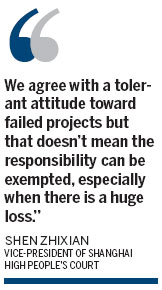Draft shields advocates of failed reforms
Updated: 2013-04-18 08:00
By Wang Zhenghua in Shanghai (China Daily)
|
||||||||

A proposal to exempt those who promote reforms from liability when pilot projects fail has triggered heated debate among legislators in Shanghai.
The draft regulation, designed to establish Shanghai as a pioneer in carrying out and encouraging reforms, was put before the Standing Committee of Shanghai People's Congress for discussion on Wednesday.
The regulation comes as this financial center of China is under pressure to pursue economic transformation and is in urgent need of reforms to open up the bottleneck that has impeded its further development, experts said.
It also supports a speech by Premier Li Keqiang on March 29, when he called for greater courage and wisdom in pushing forward economic transformation and upgrading to achieve more sustainable growth in the long term.
Li said the Yangtze River Delta, consisting of Shanghai and its powerful neighbors, can spearhead reforms and set an example for the rest of the country.
According to the draft regulation, the city government will set up an award to encourage government agencies, companies, social organizations and individuals to be braver in reforms and innovations.
It sets a standard procedure for government departments on how to carry out pilot programs, involving sending proposals, early-stage research, formulating plans, collecting opinions, seeking approvals, launching the programs and implementing reviews.
Notably, the draft also says departments or individuals, as long as they follow the standard procedures and do not seek private gain, will be granted indemnity from administrative or legal accountability even though they fail to achieve designated goals during the reforms or innovations.
They will not be given a negative assessment during performance appraisals organized by government agencies, according to the draft.
Yin Yicui, chairwoman of Shanghai People's Congress Standing Committee, said on Wednesday that the decision is expected to help sweep away the fear of government agencies from taking responsibility when launching bold reforms.
Administrative inaction, rather than arbitrary conduct, has been plaguing governments because of the fear of taking responsibility if they fail, she said.
Li Tuo, a professor of political science at the Chinese Academy of Governance, said that one of the problems that China faces is the lack of motivation to launch reforms. "In the past, it was only an oral commitment to tolerate aborted pilot projects. If the decision is eventually passed, reformers can get legal guarantees and their passion to launch reforms will be motivated."
However, Yao Haitong, secretary-general of Shanghai People's Congress Standing Committee, called for a clear definition of reforms or innovations.
"We need supportive explanations to define what these reforms and innovations mean here because these are vague terms," he said during Wednesday's panel discussion.
Shen Zhixian, vice-president of Shanghai High People's Court, zeroed in on the immunity from administrative and legal liabilities in the clause.
"We agree with a tolerant attitude toward failed projects but that doesn't mean the responsibility can be exempted, especially when there is a huge loss," he said.
Chen Zhaofeng, another veteran legislator, said a decision by a local legislation cannot override national laws.
Li Ming, general manager of Shanghai East Asia (Group) Co, said that besides government agencies, enterprises and other institutions should also be tolerated to make mistakes when pursuing reforms and innovations.
He said financial losses from failed innovative attempts should be written off, apart from the legal and administrative liabilities.
wangzhenghua@chinadaily.com.cn
(China Daily 04/18/2013 page3)

 In Photos: 7.0-magnitude quake hits Sichuan
In Photos: 7.0-magnitude quake hits Sichuan
 Li Na on Time cover, makes influential 100 list
Li Na on Time cover, makes influential 100 list
 FBI releases photos of 2 Boston bombings suspects
FBI releases photos of 2 Boston bombings suspects
 World's wackiest hairstyles
World's wackiest hairstyles
 Sandstorms strike Northwest China
Sandstorms strike Northwest China
 Never-seen photos of Madonna on display
Never-seen photos of Madonna on display
 H7N9 outbreak linked to waterfowl migration
H7N9 outbreak linked to waterfowl migration
 Dozens feared dead in Texas plant blast
Dozens feared dead in Texas plant blast
Most Viewed
Editor's Picks

|

|

|

|

|

|
Today's Top News
Live report: 7.0-magnitude quake hits Sichuan, heavy casualties feared
Boston suspect cornered on boat
Cross-talk artist helps to spread the word
'Green' awareness levels drop in Beijing
Palace Museum spruces up
First couple on Time's list of most influential
H7N9 flu transmission studied
Trading channels 'need to broaden'
US Weekly

|

|







